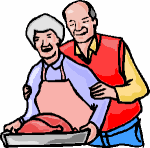|
 Sexual behavior in old age has lately become a fashionable topic. Not only scientific publications, but also popular books and magazines have increasingly turned their attention to this formerly neglected subject. Sexual behavior in old age has lately become a fashionable topic. Not only scientific publications, but also popular books and magazines have increasingly turned their attention to this formerly neglected subject.
One reason for the neglect was the unfortunate idea of an individual “life cycle” which saw old age as a return to the earlier stages of life, i.e. as a “second childhood”. Both the very young and the very old were not supposed to have any sexual interests. Indeed, in “senior residences” and nursing homes, ageing women and men were often deliberately denied any opportunity to continue existing sexual relationships or to establish new ones. It was not until the 1970s that the picture began to change: The Western mass media suddenly discovered the old as a growing segment of the population and as a target for advertising and other marketing strategies. One began to realize that people now lived longer, stayed healthier, and had more money to spend than ever before. In other words, the old were potential customers for a large array of products, from foreign travel and cruises to wellness hotels, motor homes, sports equipment, beauty creams, vitamin pills, fashions, and entertainment. As a result, they soon found themselves courted, flattered, and portrayed as a new “leisure class” of hedonistic pleasure seekers with undiminished erotic appetites.
However, this new image is as false as the old one. The biological aging process inevitably leads to a loss of physical energy, and this includes erotic energy. Sexual capacity and performance diminish, and the body shows its age: Head hair becomes white or is lost, muscles become flabby and the skin wrinkly, hearnig and eyesight become impaired, all physical reactions and movements slow down. Fortunately, however, none of this has to mean and end to satisfying sexual relationships. Without denying their own physical decline, elderly women and men can still find erotic fulfillment if they learn to ignore some of the traditional, stereotypical scripts about “sex” in old age.
|